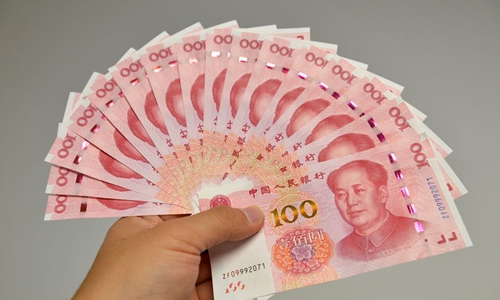
File photo shows 100-yuan bank notes, the largest denomination of the Chinese currency. (Xinhua/Li Xin)
The yuan, which has weakened in recent months, could depreciate further to more than 7.2 per US dollar amid the escalating tensions between China and the US, but long-term volatility will be controllable, Chinese economists said on Sunday.
Amid China-US tensions and uncertainties due to the global COVID-19 pandemic, the onshore yuan rate has witnessed a decrease since January, dropping from around 6.85 per dollar to 7.18 per dollar. The offshore rate even hit 7.196 per dollar on Wednesday.
"With China-US tensions growing over Hong Kong and trade, and uncertainty due to the pandemic, the yuan-dollar exchange rate could see short-term fluctuations, with the rate hitting 7.2 soon," Liu Xuezhi, a macroeconomics expert at the Bank of Communications, told the Global Times on Sunday.
Rivalry between the world's two largest economies, which have been at their worst in the past two years amid a trade dispute, escalated recently as Washington vowed to scrap the US' special economic and trading relationship with Hong Kong - one of China's special administrative regions - after Beijing passed a new national security law for Hong Kong, aiming to ensure the city's security.
However, the exchange rate, which mainly depends on a country's economic performance, will not see a continues depreciation, and it is expected to hover around 7.0-7.1 per US dollar, as China's economy is recovering from the pandemic, Liu added.
China's first-quarter economic contraction, recent China-US friction and increasing global demand for the dollar are driving the yuan's depreciation, according to Xiong Aizong, a research fellow with the Institute of World Economics and Politics at the Chinese Academy of Social Sciences.
"Despite these factors, the yuan is expected to be generally stable in the long run with high flexibility in China's economic growth, and the nation's adequate foreign exchange reserves, which ensure yuan stability," Xiong said.
"On the other hand, the US dollar is also facing depreciation pressure as the US is pushing quantitative easing measures to hedge the economic slowdown caused by the pandemic," Xiong noted.
Overall, Liu said that China's central bank doesn't need to stabilize the yuan exchange rate, as the general rate is expected to be within a controllable range, but investors and authorities should keep an eye on abnormal conditions, such as cross-border capital flows.

